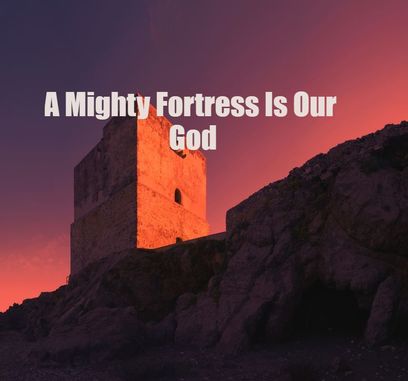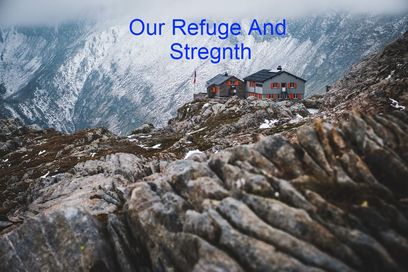 Photo by JR Korpa on Unsplash
Photo by JR Korpa on Unsplash 4 There is a river whose streams shall make glad the city of God, The holy place of the tabernacle of the Most High.5 God is in the midst of her, she shall not be moved; God shall help her, just at the break of dawn.6 The nations raged, the kingdoms were moved; He uttered His voice, the earth melted.7 The LORD of hosts is with us; The God of Jacob is our refuge. Selah
8 Come, behold the works of the LORD, Who has made desolations in the earth.9 He makes wars cease to the end of the earth; He breaks the bow and cuts the spear in two; He burns the chariot in the fire.10 Be still, and know that I am God; I will be exalted among the nations, I will be exalted in the earth!11 The LORD of hosts is with us; The God of Jacob is our refuge. Selah
A Mighty Fortress
God is our refuge and strength - God is a place to which we may flee for safety; a source of strength to us in danger. The word, "refuge," is from nāṣāʾ a verb meaning to "flee," and then "to flee to" - or to take shelter in, a place to which one would flee in time of danger -like a wall; a high tower; a fort; a fortress.
Psalm 18:2 (NKJV) The LORD is my rock and my fortress and my deliverer; My God, my strength, in whom I will trust; My shield and the horn of my salvation, my stronghold.
The idea here is, that the people of God, in time of danger, may find Him to be what such a place of refuge would be.
Proverbs 18:10 (NKJV) The name of the LORD is a strong tower; The righteous run to it and are safe.
The word "strength" implies that God is the source of strength to those who are weak and defenseless; or that we may rely on his strength "as if" it were our own; or that we may feel as safe in his strength as though we had that strength ourselves. We may make it the basis of our confidence as really as though the strength was our own.
A very present help - The word "help" here means aid, assistance. The word "trouble" would cover all that can come upon us which would give us anxiety or sorrow. The word rendered "present" māṣāʾmeans, "is found," or "has been found;" that is, he has "proved" Himself to be a help in trouble. The word "present," as if he were near to us, or close by us, does not accurately express the idea, which is rather, that "he has been found" to be present, or that he has always "proved" himself to be such a help, and that, because of that we can trust Him. The word "very," or "exceedingly," is added to qualify the whole proposition, meaning that this is "emphatically true." God had always been found to be such a helper, and, "therefore," there was nothing to fear.
 Photo by Boris Baldinger on Unsplash
Photo by Boris Baldinger on Unsplash Lyrics by Martin Luther
A mighty Fortress is our God,
A Bulwark never failing;
Our Helper He amid the flood
Of mortal ills prevailing:
For still our ancient foe
Doth seek to work us woe;
His craft and power are great,
And, armed with cruel hate,
On earth is not his equal.
Did we in our own strength confide,
Our striving would be losing;
Were not the right Man on our side,
The Man of God’s own choosing:
Dost ask who that may be?
Christ Jesus, it is He;
Lord Sabaoth His Name,
From age to age the same,
And He must win the battle.
And though this world, with devils filled,
Should threaten to undo us,
We will not fear, for God hath willed
His truth to triumph through us:
The Prince of Darkness grim,
We tremble not for him;
His rage we can endure,
For lo! his doom is sure,
One little word shall fell him.
That word above all earthly powers,
No thanks to them, abideth;
The Spirit and the gifts are ours
Through Him who with us sideth:
Let goods and kindred go,
This mortal life also;
The body they may kill:
God’s truth abideth still,
His Kingdom is forever.
Martin Luther wrote the words and composed the melody sometime between 1527 and 1529. It has been translated into English at least seventy times and also into many other languages. The words are a paraphrase of Psalm 46.

 RSS Feed
RSS Feed